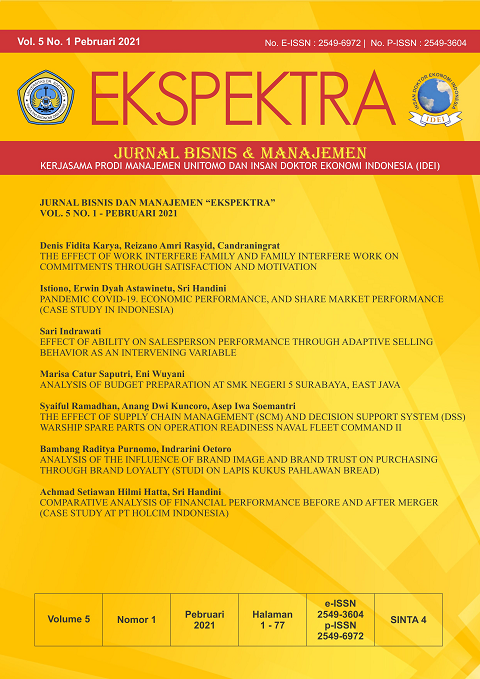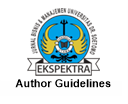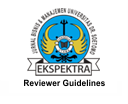THE EFFECT OF WORK INTERFERE FAMILY AND FAMILY INTERFERE WORK ON COMMITMENTS THROUGH SATISFACTION AND MOTIVATION
 Abstract views: 406
,
Abstract views: 406
,
 PDF downloads: 305
PDF downloads: 305
Abstract
This research was conducted to determine how the influence of work-family conflict (WFC), which consists of work interfere conflict (WIF) and family interfere conflict (FIW) factors on organizational commitment through the mediation of job satisfaction and work motivation on women entrepreneurs in Surabaya. The data collection technique in this study is a survey method using a questionnaire instrument filled out by respondents. The population in this study were all female entrepreneurs in the city of Surabaya. The number of samples in this study was 310 people. In this study, the data analysis method used was Partial Least Square (PLS) with SmartPLS 2.0 software. The results of the research are expected that WIF and FIW negatively affect entrepreneurial commitment through mediating job satisfaction and work motivation.
References
Bianchi, M. S, Casper, L. M & King, BR., (2006), Work, Family, Health and Well-Being, Routledge.
Boyd, et al., (2015), "Double Trouble: Work-Family Conflict and Well-Being For Second Job Holders", Journal Community, Work and Family, vol 19 (4): 462-480.
Brahmasari, Ida Ayu dan Agus Suprayetno, (2008), “Pengaruh Motivasi Kerja, Kepemimpinan, dan Budaya Organisasi Terhadap Kepuasan Kerja Karyawan serta Dampaknya pada Kinerja Perusahaan (Studi kasus pada PT. Pei Hei International Wiratama Indonesia)”, Jurnal Manajemen dan Kewirausahaan, vol.10, pp.124-135.
Candraningrat, (2017), "Pengambilan Keputusan sebagai Wirausaha Muda dan Faktor Eksternal yang Memengaruhinya di Institut Bisnis dan Informatika Stikom Surabaya", Business and Finance Journal, Volume 2, No. 1.
Candraningrat, Oktaviani dan Suhandiah, Sri, (2018). "Analysis of the success factors for MSME succession in Surabaya: A principal component analysis", Journal of Economics, Business, and Accountancy Ventura, vol. 21, No. 2, pages 207 – 217.
Choo S, dan Wong M., (2006), "Entrepreneurial intention: triggers and barriers to new venture creations in Singapore", Singapore Management Review, 28: 47-64.
Frone, M R., (1992), "Antecedents and outcomes of work-family conflict: testing a model of the work-family interface", Journal of applied psychology, vol.77, no.1, pp.65-74.
Giovanny dan Meily, (2013), “Pengaruh Work-Family Conflict terhadap Komitmen Organisasi: Kepuasan Kerja Sebagai Variabel Mediasi”, Jurnal Manajemen, vol.13 (1), pp.15-34.
Greenhaus, J. H. & Beutell, N. J., (1985), "Sources Of Conflict Between Work And Family Roles", Journal of Management Review, vol.10, pp.76-88.
Hair, et. al., (2013), A primer on Partial Least Squares Structural Equation Modeling (PLS-SEM).
Handini, dkk., (2014), “Hubungan Antara Work-Family Conflict dan Keterikatan Kerja Pada Ibu Bekerja”, Jurnal Noetic Psychology, vol.4 (2), pp.169-180.
Jajeli, Rois, (2016), Wali Kota Risma Ajak Warganya jadi Pengusaha, Diakses di m.detik.com, (Diakses pada 11 Agustus 2019).
Mangkunegara, A.A. Anwar Prabu, (2004), Manajemen Sumber Daya Manusia, Bandung: PT. Remaja Rosdakarya.
Noermijati, (2013), “Kajian Tentang Aktualisasi Teori Herzberg, Kepuasan Kerja dan Kinerja Spiritual Manajer Operasional. Cetakan Pertama. Malang: UB Press.
Riduwan, Malik, (2002). Teori Motivasi dan Aplikasi. Jakarta: Rineka Cipta.
Robbins, (2000), Management, Canada: Prentice Hall.
Sahabuddin, Romansyah, (2013), “Analisis Efikasi Diri dan Komitmen Berwirausaha serta Dampaknya pada Kinerja Usaha Rumput Laut Skala Kecil di Kabupaten Jeneponto”, Jurnal Economix, vol.1, no.1.
Santoso, R., Candraningrat, Binawati, L., (2017), "Elemen Kecerdasan Wirausaha Untuk Meningkatkan Kinerja Industri Kecil dan Menengah (IKM) di Surabaya", Bisnis dan Manajemen (BISMA), volume 10, nomor 1.
Sugiyono, (2012), Metode Penelitian Kuantitatif Kualitatif Dan R&D, Bandung: Alfabeta.
Suharmono, Natalia, P., (2015), “Analisis Pengaruh Work Family Conflict dan Ambiguitas Peran Terhadap Kinerja Karyawan dengan Stress Kerja Sebagai Variabel Intervening. Diponegoro”, Journal of Management, vol.(2), pp.1-13.
Sulistiawan dan Armuninggar, (2017), “Konflik Pekerjaan-Keluarga : Tipe Konflik dan Dampaknya Pada Kepuasan”, Jurnal Ilmiah Manajemen, vol.7 (1), pp.132 – 149.
Susan, E., (2009), Memori Kerja Dan Proses Belajar, Jakarta: Indeks.
Tunjungsari, P., (2011), “Pengaruh Stress Kerja Terhadap Kepuasan Kerja Karyawan Pada Kantor Pusat PT. Pos Indonesia (Persero) Bandung”, Jurnal Universitas Komputer Indonesia, vol.1 (1).
Boyd, et al., (2015), "Double Trouble: Work-Family Conflict and Well-Being For Second Job Holders", Journal Community, Work and Family, vol 19 (4): 462-480.
Brahmasari, Ida Ayu dan Agus Suprayetno, (2008), “Pengaruh Motivasi Kerja, Kepemimpinan, dan Budaya Organisasi Terhadap Kepuasan Kerja Karyawan serta Dampaknya pada Kinerja Perusahaan (Studi kasus pada PT. Pei Hei International Wiratama Indonesia)”, Jurnal Manajemen dan Kewirausahaan, vol.10, pp.124-135.
Candraningrat, (2017), "Pengambilan Keputusan sebagai Wirausaha Muda dan Faktor Eksternal yang Memengaruhinya di Institut Bisnis dan Informatika Stikom Surabaya", Business and Finance Journal, Volume 2, No. 1.
Candraningrat, Oktaviani dan Suhandiah, Sri, (2018). "Analysis of the success factors for MSME succession in Surabaya: A principal component analysis", Journal of Economics, Business, and Accountancy Ventura, vol. 21, No. 2, pages 207 – 217.
Choo S, dan Wong M., (2006), "Entrepreneurial intention: triggers and barriers to new venture creations in Singapore", Singapore Management Review, 28: 47-64.
Frone, M R., (1992), "Antecedents and outcomes of work-family conflict: testing a model of the work-family interface", Journal of applied psychology, vol.77, no.1, pp.65-74.
Giovanny dan Meily, (2013), “Pengaruh Work-Family Conflict terhadap Komitmen Organisasi: Kepuasan Kerja Sebagai Variabel Mediasi”, Jurnal Manajemen, vol.13 (1), pp.15-34.
Greenhaus, J. H. & Beutell, N. J., (1985), "Sources Of Conflict Between Work And Family Roles", Journal of Management Review, vol.10, pp.76-88.
Hair, et. al., (2013), A primer on Partial Least Squares Structural Equation Modeling (PLS-SEM).
Handini, dkk., (2014), “Hubungan Antara Work-Family Conflict dan Keterikatan Kerja Pada Ibu Bekerja”, Jurnal Noetic Psychology, vol.4 (2), pp.169-180.
Jajeli, Rois, (2016), Wali Kota Risma Ajak Warganya jadi Pengusaha, Diakses di m.detik.com, (Diakses pada 11 Agustus 2019).
Mangkunegara, A.A. Anwar Prabu, (2004), Manajemen Sumber Daya Manusia, Bandung: PT. Remaja Rosdakarya.
Noermijati, (2013), “Kajian Tentang Aktualisasi Teori Herzberg, Kepuasan Kerja dan Kinerja Spiritual Manajer Operasional. Cetakan Pertama. Malang: UB Press.
Riduwan, Malik, (2002). Teori Motivasi dan Aplikasi. Jakarta: Rineka Cipta.
Robbins, (2000), Management, Canada: Prentice Hall.
Sahabuddin, Romansyah, (2013), “Analisis Efikasi Diri dan Komitmen Berwirausaha serta Dampaknya pada Kinerja Usaha Rumput Laut Skala Kecil di Kabupaten Jeneponto”, Jurnal Economix, vol.1, no.1.
Santoso, R., Candraningrat, Binawati, L., (2017), "Elemen Kecerdasan Wirausaha Untuk Meningkatkan Kinerja Industri Kecil dan Menengah (IKM) di Surabaya", Bisnis dan Manajemen (BISMA), volume 10, nomor 1.
Sugiyono, (2012), Metode Penelitian Kuantitatif Kualitatif Dan R&D, Bandung: Alfabeta.
Suharmono, Natalia, P., (2015), “Analisis Pengaruh Work Family Conflict dan Ambiguitas Peran Terhadap Kinerja Karyawan dengan Stress Kerja Sebagai Variabel Intervening. Diponegoro”, Journal of Management, vol.(2), pp.1-13.
Sulistiawan dan Armuninggar, (2017), “Konflik Pekerjaan-Keluarga : Tipe Konflik dan Dampaknya Pada Kepuasan”, Jurnal Ilmiah Manajemen, vol.7 (1), pp.132 – 149.
Susan, E., (2009), Memori Kerja Dan Proses Belajar, Jakarta: Indeks.
Tunjungsari, P., (2011), “Pengaruh Stress Kerja Terhadap Kepuasan Kerja Karyawan Pada Kantor Pusat PT. Pos Indonesia (Persero) Bandung”, Jurnal Universitas Komputer Indonesia, vol.1 (1).
Published
2021-04-12
Issue
Section
Articles
Copyright (c) 2021 Ekspektra : Jurnal Bisnis dan Manajemen

This work is licensed under a Creative Commons Attribution-NonCommercial-ShareAlike 4.0 International License.
Ekspektra : Jurnal Bisnis dan Manajemenis licensed under a Creative Commons Attribution-ShareAlike 4.0 International License.






















